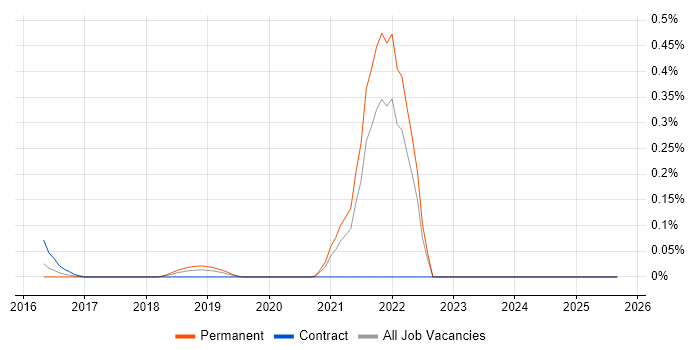Culture of Ownership (Ownership Culture)
South East > Hampshire
The table below looks at the prevalence of the term Culture of Ownership in permanent job vacancies in Hampshire. Included is a benchmarking guide to the salaries offered in vacancies that cited Culture of Ownership over the 6 months leading up to 14 October 2025, comparing them to the same period in the previous two years.
| 6 months to 14 Oct 2025 |
Same period 2024 | Same period 2023 | |
|---|---|---|---|
| Rank | 121 | - | - |
| Rank change year-on-year | - | - | - |
| Permanent jobs citing Culture of Ownership | 1 | 0 | 0 |
| As % of all permanent jobs in Hampshire | 0.049% | - | - |
| As % of the Miscellaneous category | 0.13% | - | - |
| Number of salaries quoted | 1 | 0 | 0 |
| Median annual salary (50th Percentile) | £80,000 | - | - |
| South East median annual salary | £80,000 | - | - |
All Generic Skills
Hampshire
Culture of Ownership falls under the General and Transferable Skills category. For comparison with the information above, the following table provides summary statistics for all permanent job vacancies requiring generic IT skills in Hampshire.
| Permanent vacancies with a requirement for generic IT skills | 791 | 1,126 | 662 |
| As % of all permanent jobs advertised in Hampshire | 38.70% | 31.75% | 35.40% |
| Number of salaries quoted | 379 | 596 | 494 |
| 10th Percentile | £26,733 | £33,875 | £29,000 |
| 25th Percentile | £32,500 | £42,500 | £40,563 |
| Median annual salary (50th Percentile) | £51,500 | £57,500 | £57,500 |
| Median % change year-on-year | -10.43% | - | +4.55% |
| 75th Percentile | £65,000 | £71,375 | £72,500 |
| 90th Percentile | £83,750 | £87,500 | £85,000 |
| South East median annual salary | £45,000 | £55,000 | £55,050 |
| % change year-on-year | -18.18% | -0.09% | -0.09% |
Culture of Ownership
Job Vacancy Trend in Hampshire
Historical trend showing the proportion of permanent IT job postings citing Culture of Ownership relative to all permanent IT jobs advertised in Hampshire.

Culture of Ownership
Co-Occurring Skills & Capabilities in Hampshire by Category
The following tables expand on the one above by listing co-occurrences grouped by category. They cover the same employment type, locality and period, with up to 20 co-occurrences shown in each category:
|
|
|||||||||||||||||||||||||||||||||||||||||||||
